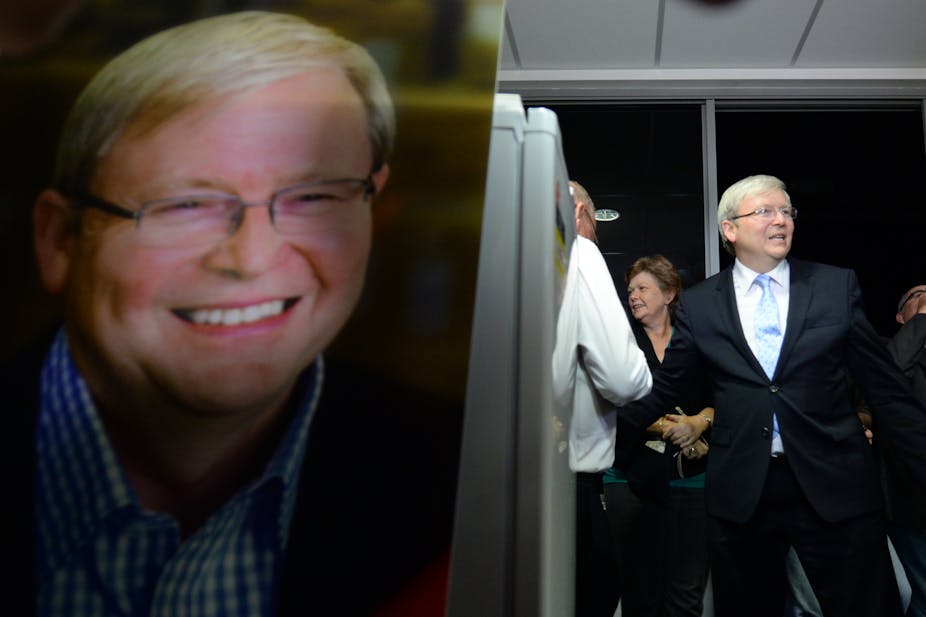Is anybody concerned that policy process is being trashed in this election? Really trashed.
Take yesterday. Kevin Rudd wanted to get some big picture vision out. So he arrived in Darwin with a plan to give companies headquartered in the Northern Territory a huge reduction in company tax.
He said his “personal objective” was that “it would be great to have a company tax rate here one third lower than the rest of the country”.
It does seem a bit strange to frame a major initiative as a “personal objective”. But the size of the cut is not set in concrete – there would be consultations with the business community and the Northern Territory government. Details would be announced next year.
That seems to leave quite a bit of wriggle room. The break would not start until 2018. That’s not just beyond wriggle room, but conveniently beyond the forward estimates so it doesn’t have to carry a cost.
And never mind that the government used to be snide about the opposition’s ideas for zonal taxation. Rudd would like eventually to extend a tax break to the north of Queensland and Western Australia - if the little problem of the constitutional difficulty could be got around (the government has a free hand in the NT because it’s not a state).
Now Labor and the Coalition have converging northern Australia policies, neither of which means much for the here and now. The Coalition promises a white paper. Among the things to be looked at will be tax breaks.
Both sides are comfortably in the same bed, but if you are a voters in the NT, don’t hold your breath.
Then there is the GST. The Coalition got an attack of the vapours after Labor claimed Tony Abbott was gearing up to broaden and increase the GST.
So Abbott declared there would be no change to the GST FULL STOP. Never mind that he would have a tax review which would include the GST, or that the FULL STOP has made the opposition tax policy illogical. Just remember the FULL STOP, and that the government has one too, so the serious revenue problems of the country, which require thought to be given to GST changes, can’t be properly considered. Unless someone, sometime in the future, blinks.
But both sides are snuggled under their blankets on the GST, so politically, everything is all right.
That was just this week’s developments in the how-not-to-make-policy story. Before that there were the Coalition’s Gonski antics. After condemning the government’s Better Schools plan as “Conski”, Abbott backflipped and embraced it, promising to deliver for four years the funds Canberra had pledged, including to the states that hadn’t signed up.
This was politically pragmatic and the plan was worth embracing, But the point is that a party has no policy credibility if it literally says one thing one day and the opposite the next. If you want to be taken seriously on policy, it’s hardly the way to do things.
But never mind, now there is no substantial difference on school funding.
Then there is Labor’s tobacco tax. Remember all the Coalition faux outrage about it? And about Labor’s bank levy? Abbott on the ABC last night flagged the opposition is likely to accept both. It needs the money. But surely it might have spared us the false posturing. (And as a former health minister Abbott knows anything that discourages smoking is worth supporting anyway.)
So, in these three big policy areas and on a couple of big revenue items (to say nothing of a whole lot of earlier savings) both sides are in broad agreement. It’s politically safer that way. Even if they continue to shout at each other about them.
Meanwhile the great argument about the opposition’s costings has dragged on all week. Abbott last night indicated the tally would not be out until the final week of the campaign, after all his announcements have been made. The government keeps on about the $70 billion the Coalition has to account for, despite fact-checking showing this is substantially inflated.
There is no doubt the opposition is under pressure over its costings. But there is always an air of unreality about this debate (I say always because it is a recurring ritual in elections).
Leaving aside the cuts that would inevitably follow the proposed commission of audit if there were a Coalition government, the total numbers the opposition produces in the dying stage of the campaign, even if ticked off by the Parliamentary Budget Office, will inevitably have an element of flakiness.
Just as the Treasury figures on the economy often turn out to be inaccurate. And partly because of that. Costings and bottom lines change through circumstances: parameters alter, things happen; other policies come forward. Who could have predicted this year’s bipartisan agreement for an increase in the Medicare levy to pay for the disability scheme - the levy that had earlier been rejected by the federal government?
So, yes, the opposition must produce credible savings and spending figures and the last week of the campaign is somewhat late. But remember, as a complete package bearing on the bottom lines of several years’ budgets, these numbers can only be credible (if they are credible) at this point of time. A few months on, it will be a different picture. Glance in the rear vision mirror from the next election, and we’ll wonder why we all sweated over them to the nearest billion.

